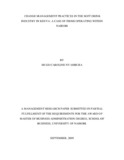| dc.description.abstract | The soft drink industry is one of the sectors of the wider economy that has witnessed
immense brand on product proliferation. There is fierce competition that forces
companies to diversify their product range in an effort to better satisfy the customers. The
entry rate into the industry has been increasing resulting to an erosion of profits for the
players. Organizations thus, have been forced to implement changes to align themselves
with the changes in the environment as well as to realize their set goals. It’s on this notion
that this study is based to identify the change management practices adopted, and the
forces of change in the soft drink industry. This study was designed to fulfill two
objectives. First, to determine the forces of change in the soft drink industry and second
to identify the change management practices adopted by firms operating in the soft drink
industry. A sample of 35 companies was selected from a population of 78 companies that
are operating within Nairobi descriptive statistics well used to analyze the information
obtained from the respondent companies. Data then was presented in form of tables,
graphs, charts, means standard deviation and frequencies. The study found out that firms
operating in soft drink industry initiate changes as a result of forces that are both from
within and without the organization specifically local competition, customer needs,
government and legislative policies, growth taking advantage of opportunities, to increase
performance, to maintain or improve industry position, to increase independence,
technology and leaders interest are among the major forces that drove organizations to
changes. Change is guided by four principles these are urgency, vision empowerment and
execution. Urgency, vision and execution are well demonstrated in the change
management practices evident in the soft drink industry. However a deficiency was
highlighted in empowerment of employees whereby organizations concentrated more on continuous communication and provision of feedback as methods of reinforcing changes.
The study recommends that companies should involve their employees in change
programs high from the conceptualization stage. Such change is inevitable, letting the
employees own the change programs will motivate them to deliver to its objectives thus
having a successful transition from one state to another | en |

